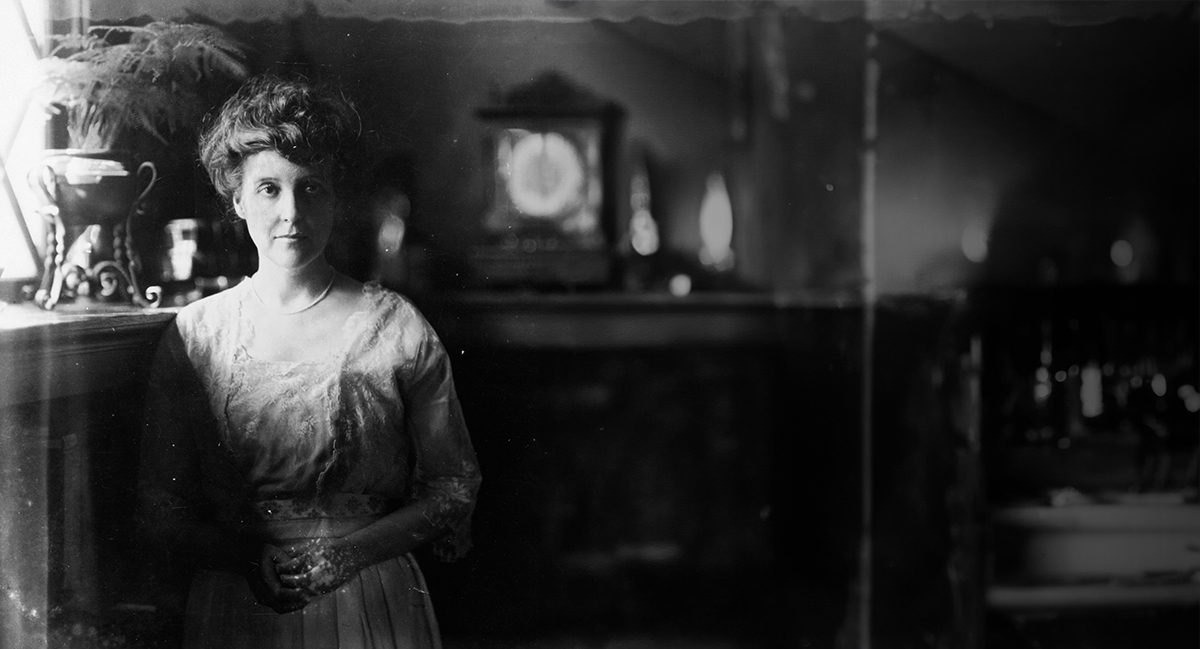
The Small-Town Writer Who Hit the Big Time
Zona Gale 1895, MA1899 achieved spectacular literary success by staying close to home.
Sinclair Lewis of Sauk Centre, Minnesota, and Thomas Wolfe of Asheville, North Carolina, are among the early-20th-century American writers who fled their small towns and then flayed them in fictional form — Lewis with Main Street and Wolfe with Look Homeward, Angel. The towns returned the snub by making each author persona non grata.
But torching your regional roots was not the era’s only literary model. Consider the case of Pulitzer-winning writer Zona Gale 1895, MA1899.
As an only child in Portage, Wisconsin, Gale gazed at the wide Wisconsin River that flowed along Canal Street. In 1881, at age seven, she wrote her first story on sheets of wrapping paper and used a ribbon to bind the pages into a book. She read canonical works, including John Milton’s Paradise Lost and John Bunyan’s The Pilgrim’s Progress, and recorded each plot in a notebook. Clearly this was an author in the making, and her parents supported her literary efforts — unusual for her time and place, not to mention her gender. With her mother’s encouragement, she submitted a novel for publication at age 13 and received the first of what would be many rejection letters.
In 1891, Gale entered the University of Wisconsin and made a mark on the male-dominated campus. She achieved her first success as a writer, publishing in the college literary magazine. In her spare time, she even placed a story in Milwaukee’s Evening Wisconsin. When the newspaper mailed her first professional payment — a three-dollar check — she rode the train all the way from Madison to Portage to show it off to her parents.
In 1904, Gale made a career move that would have baffled most successful writers.
Following graduation, Gale headed straight for the Evening Wisconsin office, presenting herself to the editor every day for two weeks until he agreed to let her write another story. It was a trifling assignment — a report on a flower show — but Gale gave it everything she had. “I have never put so much emotion into anything else that I have written,” she recalled. Knowing a star when he saw one, the editor made a spot for her on staff.
After earning a master’s degree in literature from the UW, the ambitious writer applied herself to breaking down doors in New York City. She showed up at the New York World day after day with a list of stories she was prepared to write, until the skeptical editors finally relented. She secured a staff job, impressed the Manhattan literati, and — after a few more rejection letters — published short stories in prominent magazines.
In 1904, however, Gale made a career move that would have baffled Sinclair Lewis and Thomas Wolfe. She returned to Portage for the rest of her life.
The Home Folks and Neighbors
The small-town setting became the wellspring of Gale’s fiction: the courthouse, post office, churches, bakeries, twilight bonfires, holidays, funerals, young lovers, town gossips, wise elders, and, of course, the life-giving river. Birth, Miss Lulu Bett, and other best-selling books inspired by Portage made her a leading practitioner of literary realism. She drew on her journalistic skills to examine the pleasures and pitfalls of provincial life, particularly the obstacles to women’s fulfillment.
The plight of one such thwarted heroine is the subject of Miss Lulu Bett, which Gale turned into a daringly true-to-life play that won a 1921 Pulitzer Prize in the drama category — the first ever awarded to a woman or a UW alum. Gale sat in the audience with her Portage friends when a touring production of Miss Lulu Bett opened in Madison later that year. Cheered by the crowd, the author went on stage to thank “the home folks and neighbors.”
Gale used the substantial earnings from her books’ sales to build a Greek Revival–style house on Canal Street, with a study facing the beautiful Wisconsin River. She didn’t hole up there, though — not with a host of problems to solve in her city and state. Few writers have matched Gale in civic involvement. She spoke out for women’s rights, racial equality, education, and pacifism, and she put her time and money where her mouth was. Her advocacy for women students earned her a spot on the University of Wisconsin Board of Regents. She also joined the University of Wisconsin Board of Visitors, the American Union against Militarism, the Wisconsin Free Library Commission, the Woman’s Peace Party, and the National Woman’s Party, helping to draft the Wisconsin equal rights law in 1921. So greatly did she care about her hometown that she even advocated for saving a stately oak tree that was endangered by a new building.
Why would a rich, famous, critically acclaimed writer choose to spend her days in Portage? Gale put it simply: “I have my river.” •
Dean Robbins is the coeditor of On Wisconsin and, like Zona Gale, a die-hard lit major.
Published in the Summer 2024 issue



Comments
Emry July 28, 2024
Yeah She is great.